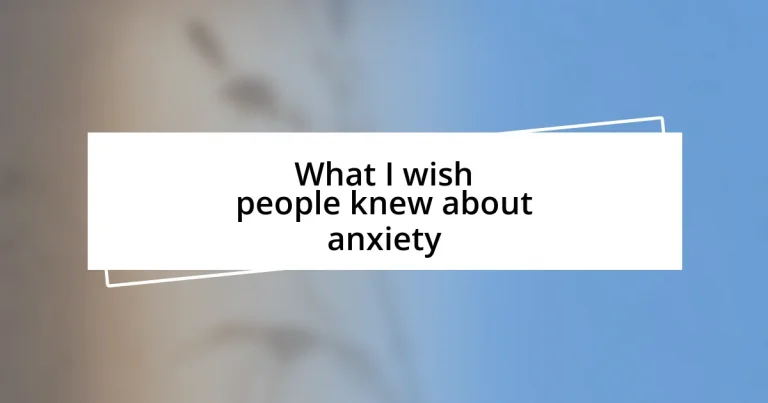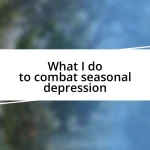Key takeaways:
- Anxiety manifests through various physical and emotional symptoms, often misinterpreted as mere stress or nervousness, highlighting the need for understanding and proper management.
- Common misconceptions about anxiety include the belief that it is a sign of weakness or that it can be easily controlled, when in fact, it requires effective coping strategies and professional help.
- Support systems, including friends, family, and therapy, play a crucial role in navigating anxiety, alongside practical coping techniques such as mindfulness and routine establishment.
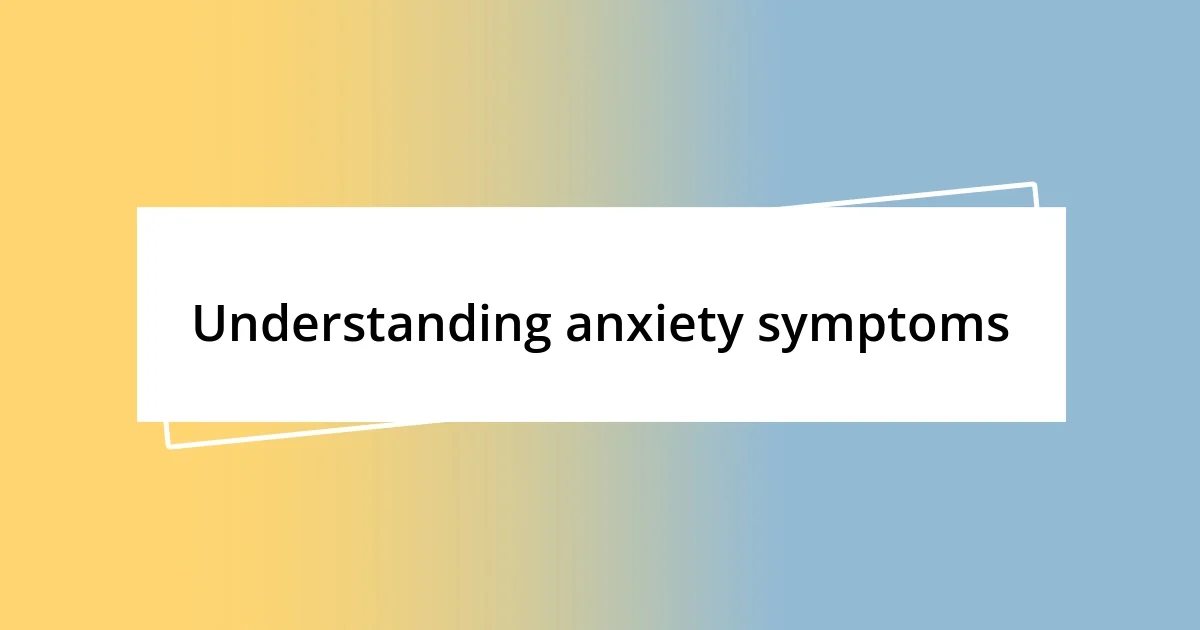
Understanding anxiety symptoms
Anxiety symptoms can manifest in numerous ways, often catching people off guard. I remember the first time my heart raced uncontrollably during a seemingly harmless meeting. It made me wonder, “Why is my body reacting like this?” It’s as if anxiety has its own language, and it’s crucial to learn how to interpret the signals it sends.
Physical symptoms like rapid heartbeat, sweating, or even trembling can feel overpowering. There were moments when I thought I was having a heart attack, only to realize it was just anxiety manifesting itself. Have you ever felt a tightness in your chest that made you question your wellbeing? It’s a reminder that our bodies can communicate discomfort, and understanding these signals is key to managing anxiety.
On the emotional side, anxiety often breeds feelings of dread and worry. I recall days when the mere thought of an upcoming event sent me spiraling into self-doubt. Have you experienced that wave of panic that seems disconnected from the situation? Recognizing these feelings is essential. It helps us not only normalize our experiences but also empower ourselves to seek support and find effective coping strategies.
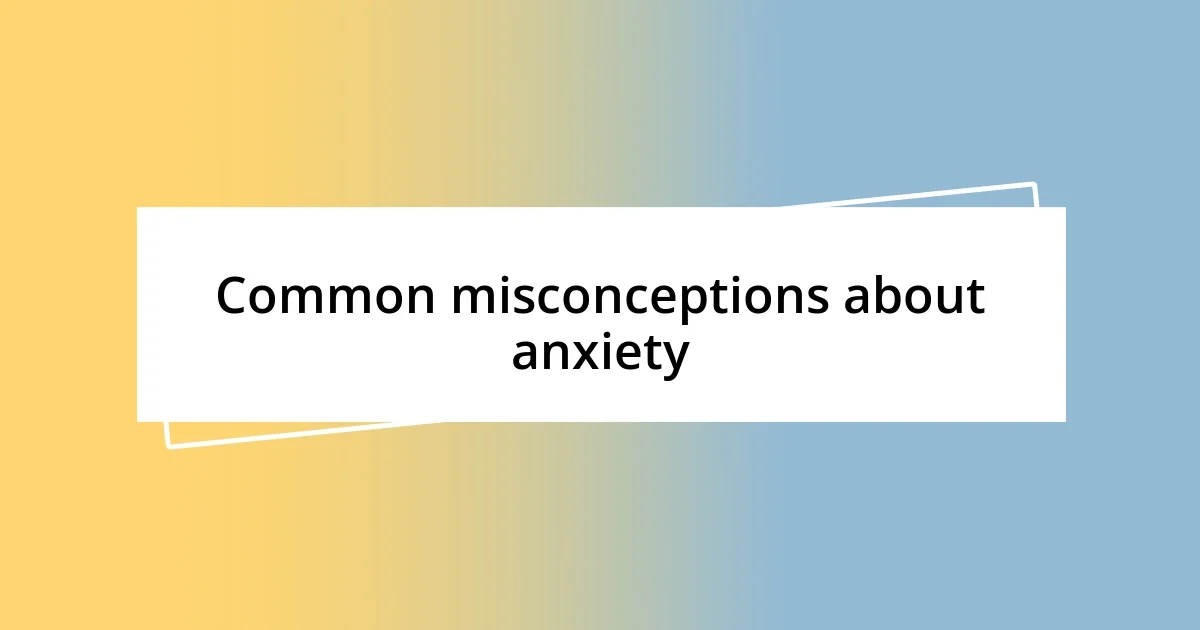
Common misconceptions about anxiety
It’s surprising how many misconceptions swirl around anxiety, often leading to misunderstandings about what it truly entails. Many folks believe that anxiety is merely feeling nervous or worried, overlooking the profound impact it can have on daily life. I remember when a friend told me, “Just calm down, it’s not a big deal,” during one of my anxious moments. That comment, though well-intentioned, left me feeling even more isolated and misunderstood—anxiety can feel like a heavy fog that clouds your thinking and makes even the simplest tasks appear monumental.
Here are some common misconceptions about anxiety:
– It’s just stress: While anxiety can be a response to stress, it’s an emotional disorder that can linger even in the absence of immediate stressors.
– You can easily control it: People might say, “Just think positive thoughts,” but for many, managing anxiety requires more than just a mental shift—it can need therapy, medication, or lifestyle changes.
– Anxiety is a sign of weakness: This belief is damaging. Many resilient and strong individuals experience anxiety; it’s not a character flaw.
– Everyone feels anxious the same way: Symptoms can vary widely from person to person, and it’s essential to recognize that there’s no one-size-fits-all experience.
– You have to be in a crisis to seek help: Many people wait until they’re overwhelmed before reaching out. Seeking help early can make a significant difference in managing anxiety.
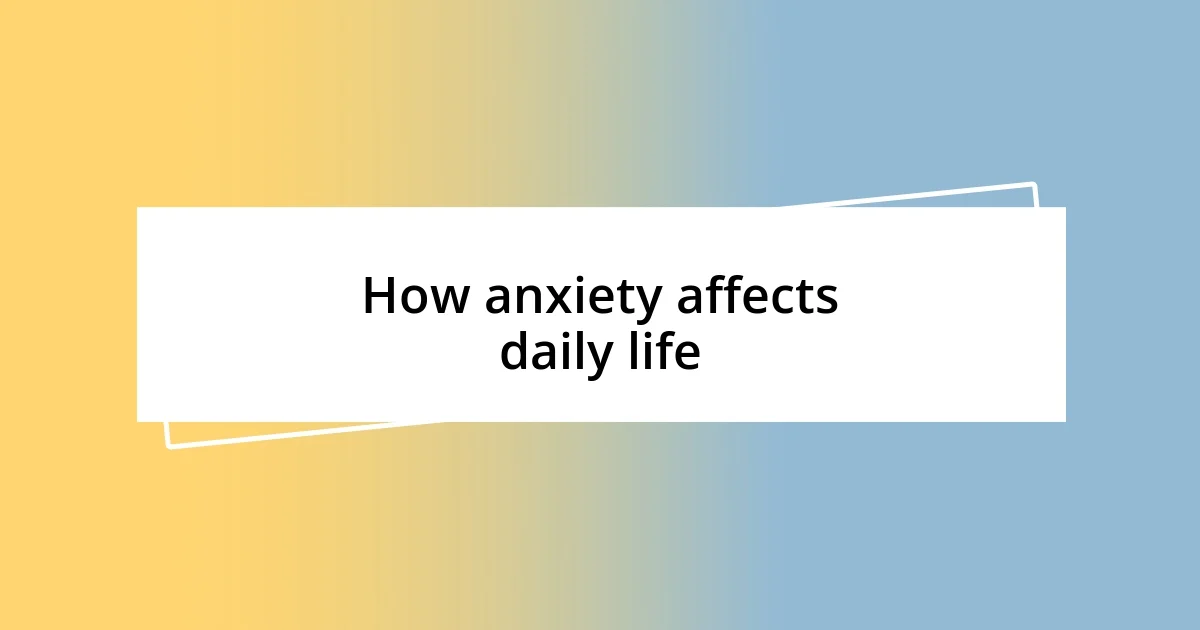
How anxiety affects daily life
Anxiety can ripple through daily life in unexpected ways. For instance, I often remember mornings when just stepping out of bed felt like preparing for battle. The anticipation of interactions, whether at work or with friends, could trigger a wave of worry that left me frozen for a moment. Can you relate to waking up and feeling that heavy weight of anxiety before even starting the day?
Even routine tasks can become colossal challenges. Going grocery shopping, for example, transformed from a simple errand into an overwhelming excursion. I’ve been in the aisle, surrounded by hundreds of choices, only to feel paralyzed by the fear of making the wrong decision. It’s strange how something so mundane can morph into a battleground of thoughts and emotions. I wonder how many of you have felt similarly when faced with what should be an everyday activity.
Social situations can also be daunting. I’ve had countless times where I’d RSVP to an event but dread the thought of actually attending. The inner dialogue creates a storm of self-doubt, asking questions like, “What if I don’t fit in?” Anxiety can act as both a thief of joy and a barrier to connection, preventing me from enjoying moments with family or friends. If you’ve ever felt uneasy in social settings, keep in mind that you’re not alone—these experiences can be part of the anxiety journey.
| Daily Life Impact | Description |
|---|---|
| Morning Anxiety | Feeling overwhelmed from the moment you wake up, impacting the whole day. |
| Task Paralysis | Simple tasks like grocery shopping can feel daunting due to overwhelming choices. |
| Social Interactions | Intense worry about fitting in can hinder participation in enjoyable events. |
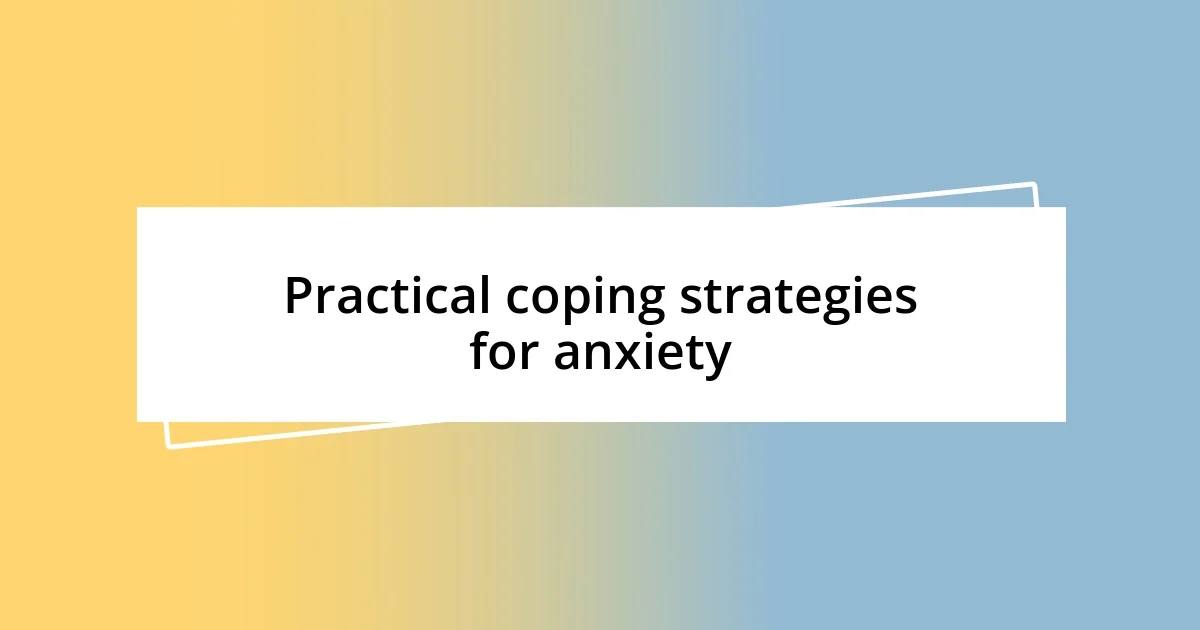
Practical coping strategies for anxiety
When I feel anxiety creeping in, one practical strategy is to create a “grounding list.” It’s something I’ve developed over time, where I jot down five things I can see, four I can touch, three I can hear, two I can smell, and one I can taste. This exercise pulls me back to the present moment and helps quiet the storm of thoughts swirling in my mind. Have you ever tried something similar?
Another approach that I’ve found helpful is the practice of deep breathing. When I sense an anxious moment approaching, I take a few minutes to inhale deeply through my nose, hold it, then exhale slowly through my mouth. Focusing on my breath has a calming effect, almost like hitting a reset button for my thoughts. It’s fascinating how something so simple can make a significant difference, don’t you think?
Lastly, I can’t emphasize the value of routine enough. For me, establishing a daily structure helps create a sense of normalcy amidst the chaos of anxiety. Whether it’s regular exercise, setting aside quiet time for myself, or sticking to consistent meal times, these familiar patterns provide comfort and reduce feelings of unpredictability. What routines have you established that help you cope with anxiety?
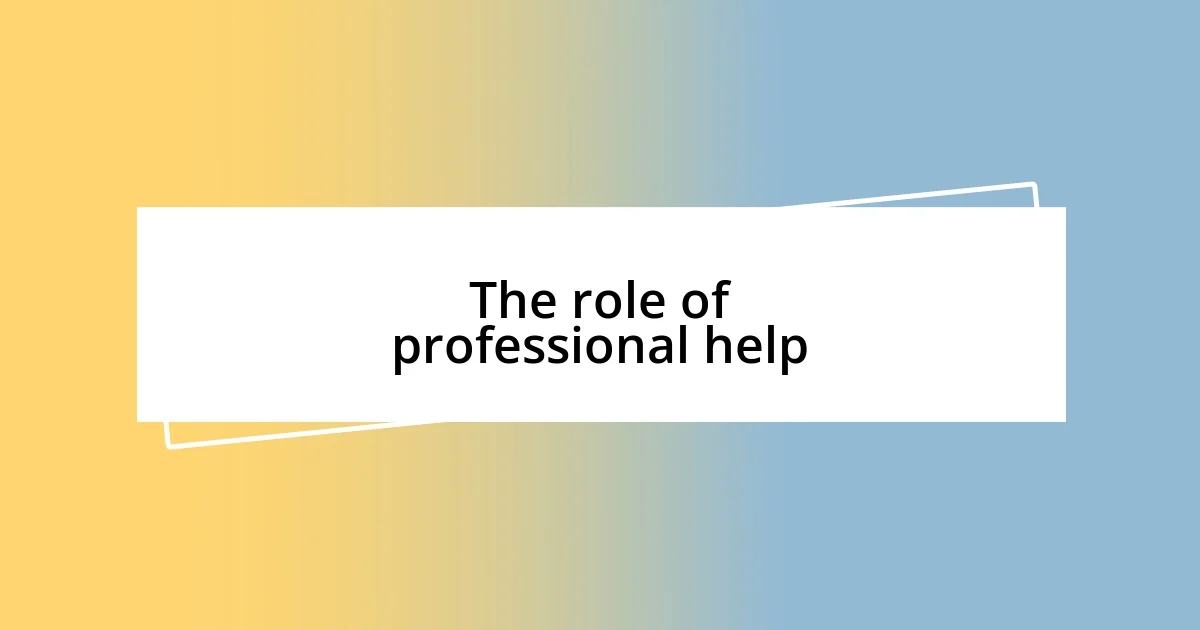
The role of professional help
Seeking professional help can feel daunting, but it’s often a vital step in managing anxiety. I remember my first therapy session; I was anxious about sharing my struggles. However, once I opened up, I realized that having someone listen without judgment created a safe space. Can you imagine how liberating it feels to discuss your feelings with a trained professional who’s there to support you?
Therapists provide tools and strategies tailored to individual needs. For example, Cognitive Behavioral Therapy (CBT) helped me recognize negative thought patterns and replace them with healthier alternatives. That transformative experience made me appreciate the power of professional guidance. It’s worth asking yourself: How might understanding my anxiety from a different perspective change my daily life?
Moreover, medication can play a significant role for some individuals. When my overwhelming anxiety felt too heavy to bear, a psychiatrist prescribed medication that made a noticeable difference. It wasn’t a cure-all, but it offered me a sense of relief that I thought was unattainable. Have you considered how the right combination of therapy and medication could reshape your relationship with anxiety?
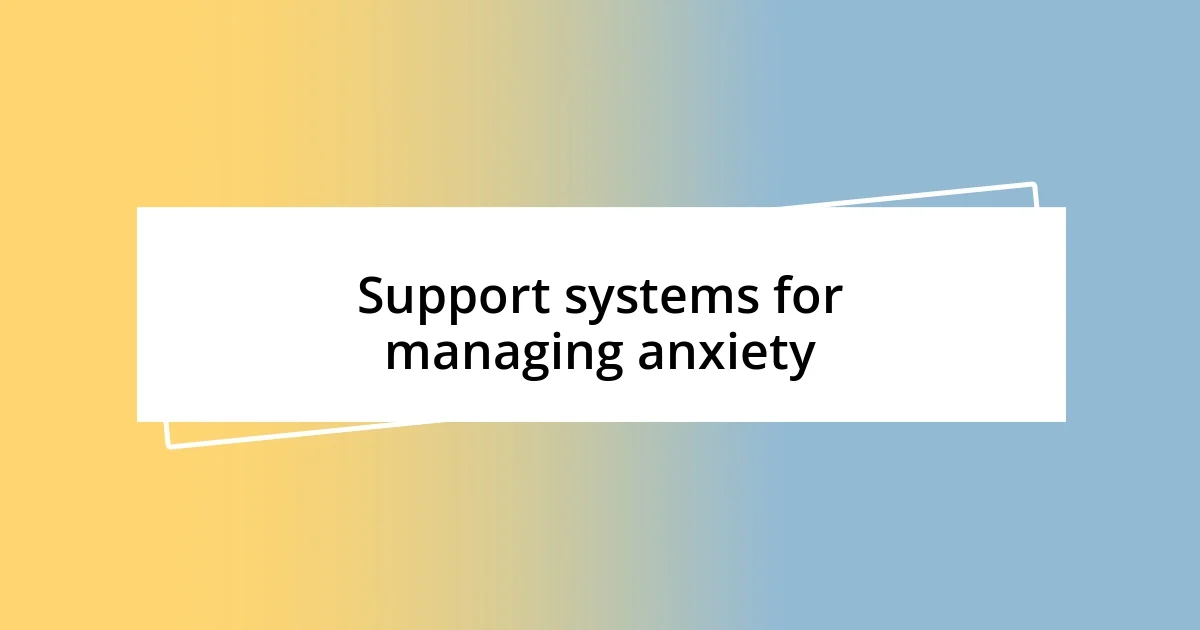
Support systems for managing anxiety
Having a solid support system is crucial when navigating anxiety. I’ve found that sharing my experiences with trusted friends makes a world of difference. When I open up, it often leads to thoughtful conversations that reveal I’m not alone in my feelings; there’s something comforting in that shared vulnerability. How often do we find ease when we realize others can relate to our struggles?
Family can also be a pillar of strength. I remember a challenging week when my anxiety felt almost unbearable. My sister reached out and offered to spend time together, distracting me with books and laughter. That simple gesture reminded me of the healing power of connection. Have you experienced that type of support from loved ones during tough times?
Joining support groups can be incredibly beneficial as well. I once attended a local meet-up, not knowing what to expect. The relief of speaking to others who truly understood my struggles was invaluable. It’s a reminder that creating a community around shared experiences can foster healing. Isn’t it remarkable how coming together with others can lighten the emotional load we carry?
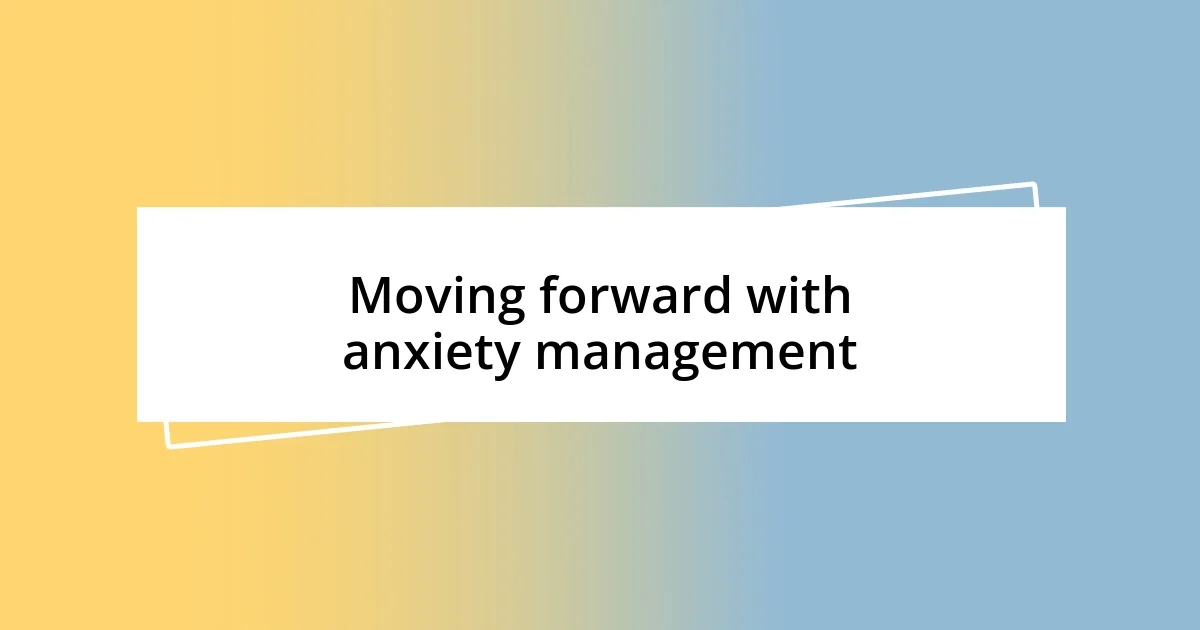
Moving forward with anxiety management
Finding effective techniques to manage anxiety can be a game-changer for many. I remember starting a mindfulness practice, and at first, I was skeptical—how could sitting quietly help me? However, the first time I noticed a reduction in my racing thoughts during meditation, it clicked for me. I often wonder: How might small, intentional moments of mindfulness enhance your daily interactions and overall well-being?
Establishing a routine that incorporates physical activity can also pave the way for improved mental health. One day, I decided to go for a morning run, challenging myself to push through the initial discomfort. The endorphin boost made me feel lighter, both physically and mentally. Have you thought about how even a short walk could transform your day and help manage anxiety?
Moreover, prioritizing self-care can make a significant difference in how we manage anxiety long-term. I once dedicated Fridays to self-care rituals—whether it was painting, reading, or indulging in a warm bath. Those moments allowed me to reconnect with myself, helping to alleviate tension. Could setting aside time for self-care be a simple yet effective way for you to foster resilience against anxiety?












